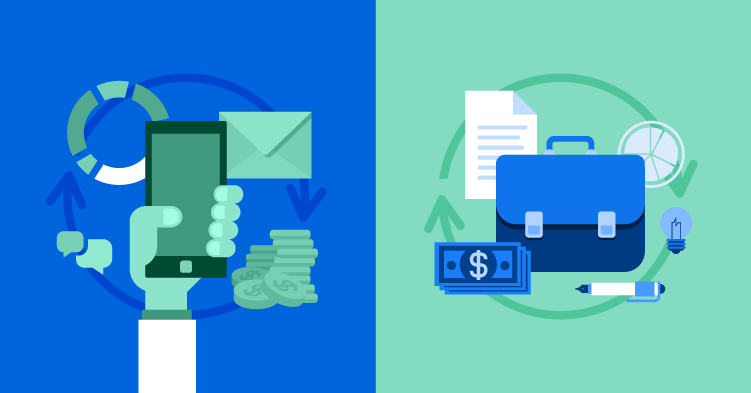Personal Line of Credit vs. Business Line of Credit: What’s the Difference?
If you’re considering a line of credit for business financing, it’s important to understand the difference between a personal line of credit and a business line of credit. While they may seem similar at first glance, there are significant differences that can impact your financial stability and the growth of your business.
What’s the Difference Between a Personal Line of Credit and a Business Line of Credit?
The main differences between a personal line of credit and a business line of credit are who and what they are intended for, as well as who is responsible for repayment.
A personal line of credit is a type of funding that’s issued to an individual for their personal expenses. A person’s eligibility for a line of credit — and ultimately their credit limit, interest rates and terms — are determined by their credit history, income and overall financial stability. The individual borrower is personally responsible for repaying the borrowed funds.
A business line of credit is a type of short-term, small business credit line designed exclusively for business-related expenses. The business’s revenue, profitability and credit history are taken into account by the potential lender during the application process. A business line of credit is usually tied to your business credit score, not your personal credit score, and the business is responsible for repayment (subject to any applicable personal guarantee).
If you need financing for personal expenses or investments, a personal line of credit may be an appropriate choice, with your personal credit profile playing a significant role. If your aim is to support your business’s financial needs, a business line of credit is tailored to that purpose, leveraging your business’s financial strength and creditworthiness to secure financing.
How Does a Line of Credit Work?
Both personal and business lines of credit operate as revolving credit. Borrowers are approved for a specific amount of money — a credit limit — and they can borrow and repay any amount of funds within that limit as needed. Interest is typically charged only on the amount borrowed, making it a flexible financing option for personal or business needs.
For example, if you have a $10,000 line of credit and borrow $5,000, you’ll only pay interest on that $5,000 balance. As you repay the borrowed amount, the credit becomes available for future use.
There are secured and unsecured lines of credit. A secured line of credit requires collateral — real estate, vehicles, etc. — that you pledge as security for the credit line. An unsecured line of credit does not require collateral. Both personal and business lines of credit are typically unsecured.
Why Do I Need a Business Line of Credit?
A business line of credit offers several advantages for small business owners.
Cash flow management. If your business experiences seasonal fluctuations or cyclical sales patterns, a business line of credit can be a lifeline. A line of credit can help bridge cash flow gaps, ensuring your business can cover operational expenses, payroll and unexpected costs during slow periods.
Seizing opportunities. Whether it’s an attractive inventory purchase, a new marketing campaign or a chance to expand your operations, a business line of credit can give you the working capital you need to seize business opportunities.
Flexibility. Unlike a traditional term loan, where you receive a lump sum, a line of credit lets you borrow what you need when you need it. You’re not obligated to use the entire credit limit, and you only pay interest on the amount you’ve borrowed. This flexibility provides you with greater control over your finances.
Build business credit. Responsible use of a business line of credit can impact your business credit history. A positive business credit history can open doors to more favorable financing terms, larger credit lines and better supplier relationships, enhancing your business’s financial reputation.
Can I Use a Personal Line of Credit for My Business?
While it may be possible to use a personal line of credit for business expenses, it’s generally not advisable. Mixing personal and business finances can lead to complications and make it challenging to track and report business expenses accurately.
Furthermore, personal lines of credit are typically smaller than business lines of credit, which may limit your ability to finance larger business initiatives. Using personal credit for business purposes can also jeopardize your personal finances if the business faces financial difficulties.
What’s the Difference Between a Business Line of Credit and a Business Credit Card?
While both are revolving credit tools, a business line of credit and a business credit card have some differences.
A business credit card functions similarly to a personal credit card, with a predetermined credit limit. You can make purchases on the card, repay the balance and continue using it within the approved credit limit. There are minimum monthly payment requirements, typically a percentage of the outstanding balance. If you carry a balance beyond the due date, you’ll be charged interest on the unpaid amount.
Credit card interest rates can be relatively high, which can be costly if you carry a balance from month to month. While some business credit cards offer introductory 0% APR promotions for a limited time, regular rates tend to be higher than those for lines of credit.
With a business line of credit, you can usually access funds in various ways, including writing checks, transferring money to your business bank account or using a linked credit card. This flexibility allows you to manage various financial needs, from covering operational expenses to addressing emergencies. Interest rates on business lines of credit are often lower than those on credit cards. Rates are usually based on the prime rate and can vary depending on your business’s creditworthiness.
Small business owners could consider using a business line of credit when they require flexible access to capital for ongoing expenses, seasonal fluctuations or unexpected emergencies. Business credit cards are convenient for making day-to-day purchases, managing travel expenses and building credit history for your business. Some business credit cards also offer rewards programs, such as cash back or points, which can be beneficial if used strategically.
Alternative Financing Options for Your Business
In addition to a line of credit, there are other types of financing you can look into.
Business loans. Business term loans, sometimes called traditional business loans, are similar to personal loans: they offer a lump sum of money with fixed interest rates and repayment terms. They are usually used for larger, one-time expenses for a specific purpose, such as equipment or expansion. Business loans are usually offered by traditional banks, credit unions and online lenders.
Small Business Administration (SBA) loans. The SBA doesn’t directly lend to businesses, but partners with approved lenders to provide guarantees on a portion of the loan amount, reducing the risk for lenders and making it easier for small businesses to secure funding. There are different types of SBA loans, each tailored to specific purposes. To apply for an SBA loan, a business typically needs to meet specific eligibility criteria. While SBA loans typically offer lower interest rates and longer repayment periods than many other loan options, they are often much more difficult to secure.
This content is for educational and informational purposes only, and is not intended as financial, investment or legal advice.



